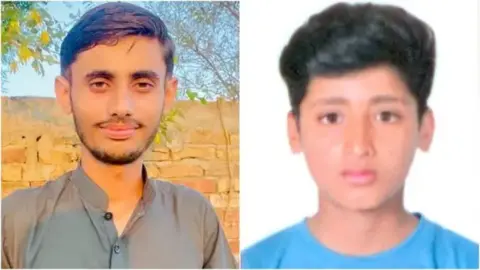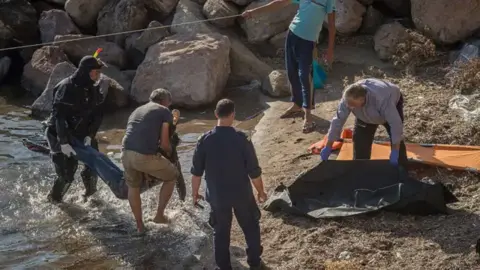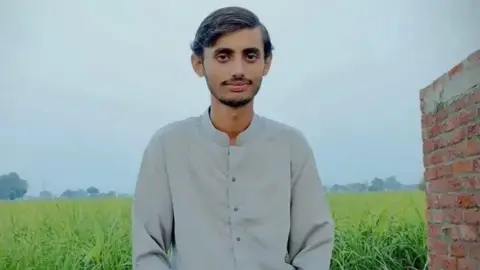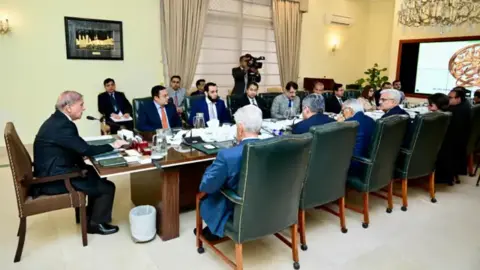'I bought my son's death': Families mourn victims of migrant shipwreck
 Ammar Bajwa/ Naveed Asghar
Ammar Bajwa/ Naveed AsgharJaved Iqbal, a Pakistani carpenter working in Saudi Arabia, tells BBC Urdu that he deeply regrets his decision to illegally send his 13-year-old son to Europe.
"The agents had sent dozens of boys from the village to Greece and Italy," he says. "My son, who was stubborn and fell for their tricks, told us repeatedly, 'If you don't send me to Europe, I will leave home.'"
Javed's son, Mohammad Abid, was among five Pakistani nationals who authorities confirm died in waters near Greece after three boats carrying migrants capsized last week.
Pakistani authorities have urged parents to stop their children from embarking on such journeys. But it has not stopped hundreds of youths from trying.
While 47 people from the recent disaster have been rescued, according to embassy officials in Greece, the 35 who remain missing are now presumed dead after the Greek Coast Guard called off rescue efforts on Wednesday.
BBC Urdu spoke to the grieving families of two victims from the district of Pasrur, in central Punjab.
"When will the day come when I too will go to Europe?"
Of Javed's four children, Abid was the third.
"Abid's elder brother and sister go to school, but Abid stopped going to school," says Javed, who lives and works in Saudi Arabia.
Over the past two years, several of their relatives, as well as other boys from their village, have gone to Greece through agents, he added.
All these boys would upload videos on social media after they arrived in Greece. After seeing social media videos shared by these boys, Abid would ask, "When will the day come when I too will go to Europe?"
"I explained to him many times that you are still young, you can go when you grow up, but he remained adamant," says Javed. "I told him to come to me in Saudi Arabia, but his only wish was to do go Europe."
In a recent press conference, Pakistan's Ambassador to Greece, Aamar Aftab Qureshi, expressed surprise that a child was among the five Pakistani nationals who died in the accidents. He added that young children were among the survivors.
"This trend of sending children illegally is extremely dangerous," he said.
 Getty Images
Getty ImagesBut Javed says that whenever Abid returned home after meeting these agents, he would threaten to leave home if his mother did not raise money to send him.
"She would make me talk to him on the phone, and I would explain to him. He would agree temporarily, but after a day or two, he would go off the rails again," Javed says.
So Javed sold part of his farm land and his wife sold some of her jewellery. They paid the agent 2.56 million Pakistan rupees (£7,300; $9,200) to bring Abid to Europe.
Javed says that his son arrived in Egypt from Faisalabad airport and then went to Libya, where he stayed for two months and kept in contact daily with his family.
"He was happy and kept saying that there were some difficulties, but that they were temporary and he would soon reach his destination," says Javed. "We didn't know that his destination was not Europe, but death."
"When there was a rumour about a boat capsizing in the sea near Greece, we tried to get information but nothing was coming out," he recalls.
The family eventually managed to get in touch with a friend in Greece, who went to the migrant hospital and found Abid's body. They also subsequently received a call from the Pakistani embassy in Greece.
'We are dying moment by moment'
In Ucha Jajja, another village in central Punjab, is another family grieving the death of their son. Irfan Arshad's 19-year-old son Muhammad Sufyan was also killed in the accident, as confirmed by Pakistani authorities in Greece.
According to Irfan Arshad, the agent deceived them until the last moment, saying that he was sending their son safely in a boat and that there was no need to worry.
"When there was chatter in the village that the boat had capsized near Greece, darkness fell before our eyes," Irfan says. "It feels like I bought my son's death with my own hands by paying three million rupees."
Irfan, who owns an oil and fertiliser shop, has four sons. Two of them are living in Bahrain, while the third son is already in Greece. He sold an acre of land to send his youngest son to Greece.
 Naveed Asghar
Naveed AsgharThe FIA has filed a human trafficking case against four people over the death of Muhammad Sufyan. According to Irfan's account in the report, after Sufyan was taken to Libya, the agent had assured them that Sufyan would be transferred to Greece soon. Instead, Sufyan was kept in a safe house in Libya for two months and only given one meal a day.
"My son got cholera from eating stale food, which made him very weak," Irfan says. "Whenever we talked to Sufyan, he sounded very worried. We kept thinking maybe it was because he was away from home for the first time, and when he reached Greece, he would be very happy."
After he was finally put on a boat to Greece, Sufyan's family received a call from his companions about his death.
In 2023, a boat carrying illegal immigrants sank around the same area of Greece, resulting in the death of 262 Pakistanis. After the tragedy, authorities vowed a strong response against agents involved in human trafficking.
 PM Office
PM OfficeSuch sentiments were echoed again on Wednesday as officials met to discuss the latest tragedy. Prime Minister Shehbaz Sharif said that the repeated occurrence of such incidents is a matter of concern for Pakistan, and vowed strict action against those involved in human trafficking.
Abdul Qadir Qamar, regional director of the Federal Investigation Agency, told BBC Urdu that the suspects have been running a human trafficking ring in different countries for a long time.
"The FIA's investigation so far has revealed that the suspects who illegally sent youths abroad in Pasrur belong to the same family," he said. "And these suspects have so far sent hundreds of people abroad illegally."
The problem, he said, was that the families of boat accident survivors often do not want to take action against the agents.
The court has recorded 174 cases of human trafficking so far. Only four have been convicted.
Irfan says that Pakistan's foreign ministry told him Sufyan's body would reach Pakistan in early January - but that is too long a wait for his family.
"We are dying moment by moment," Irfan says. "Until we see our son's body, we will be neither living nor dead.
"How can those whose sons die ever have peace?"
